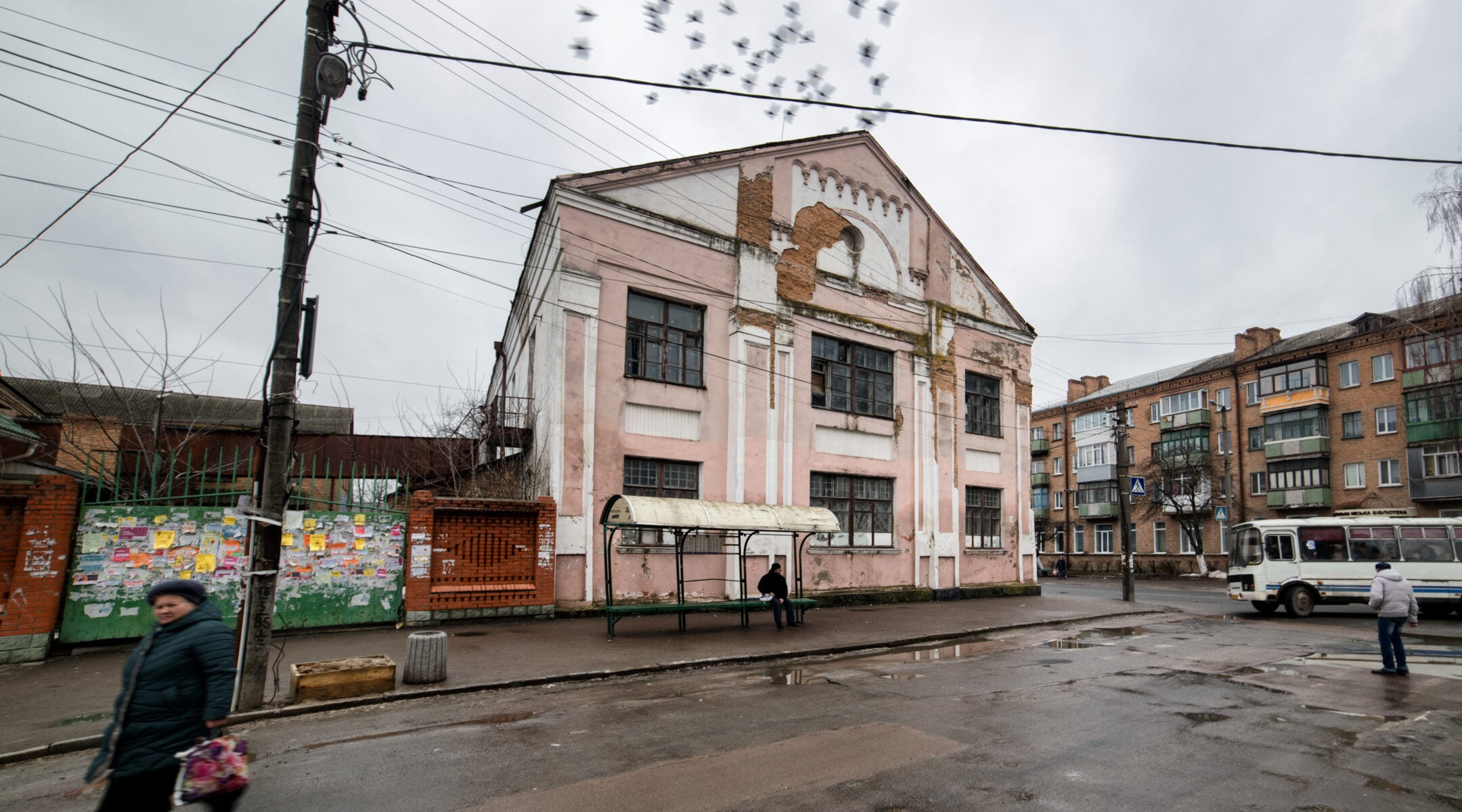BERDYCHIV, Ukraine — Back in early 2022, Hennadiy Kysliuk felt that he was on the verge of a breakthrough in his mission to create a memorial at the site where Nazis massacred this Ukrainian city’s Jews in six pits on a single day in 1941.
Kysliuk, who is a leader of Berdychiv’s Orthodox Jewish community, thought he had the permission he needed to replace the two stone tablets that stand at the site, far from the city center in an unassuming field, with something more substantial.
“In 2022, I started the process of privatizing this territory as a memorial,” said Kysliuk, 45, who has been volunteering at the the city’s Orthodox synagogue for as long as he can remember. “There was an organization at that moment, at the government level, which was responsible for such processes. They gave me the documents, and I paid all the fees.”
Then Russia invaded Ukraine. Located about 100 miles southwest of Kyiv, Berdychiv escaped the most intense onslaught, but the local priorities quickly changed from preserving the past to ensuring survival in the present. Three years later, the field where tens of thousands of Berdychiv’s Jews were executed is unchanged — with the exception of a wooden stake erected on the edge of one of the mounds that signals at the grim layers below.
“Members of the local authority contacted me last year,” Kysliuk said, gesturing to the stake. “Those guys were responsible for making measurements of the ground, and they said that the territory of the military base is here.”
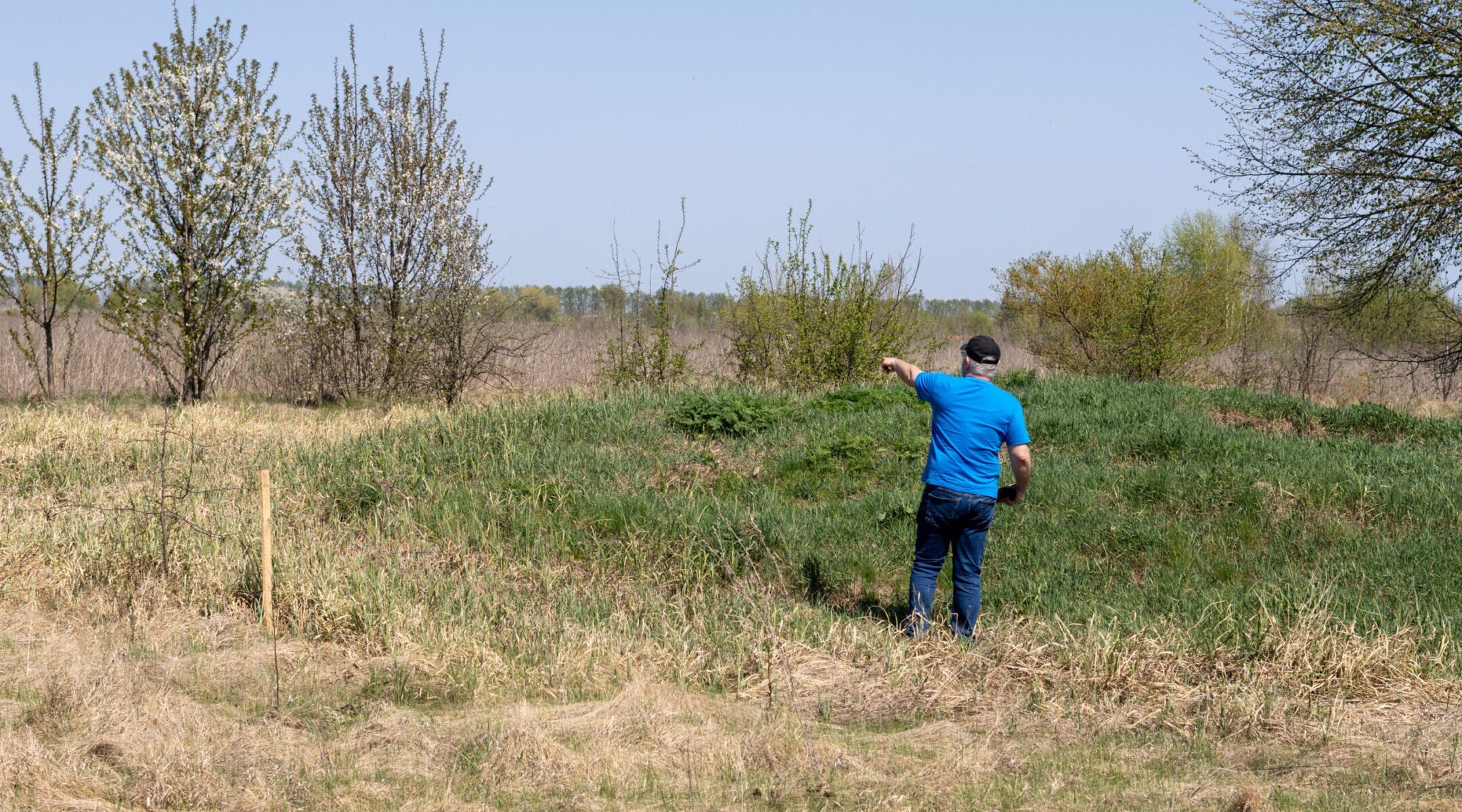
Hennadiy Kysliuk gestures at an area in Berdychiv, Ukraine where tens of thousands of Berdychiv’s Jews were executed during the Holocaust, May 2025. Local authorities say the land is reserved for a military base. (Theia Chatelle)
The Executive Committee of the Berdychiv City Council did not respond to multiple requests for comment about the registration of the public memorial to victims of the Holocaust or the dispute over the boundaries of the military base.
Kysliuk’s experience with the memorial reflects the challenging reality for Jews in Ukraine three years into war, particularly in smaller cities like Berdychiv. The war effort, which has ground to something of a stalemate amid pressure for a diplomatic resolution, is commanding significant communal resources, while Jewish communities are increasingly struggling to meet their own needs.
Many of Ukraine’s Jews have fled either to Europe or Israel, but the Institute for Jewish Policy Research estimates that there is a core Jewish population of 32,000 still living in Ukraine. The population is a shadow of the 2.7 million Jews who lived there on the eve of the Nazi invasion and significantly smaller than before the current war. Most of those who remain are highly assimilated and have only a tenuous connection to their Jewish identity.
While there is not an official count of Berdyvhiv’s Jewish population, mention Berdychiv to any Ukrainian, and they will know it as a Jewish city — even though all but a handful of its once-thriving Jewish population was murdered in the Holocaust.
Located about an hour and a half from Kyiv, the city of about 75,000 was once known as the “Jerusalem of Volhynia” because of its role as a hub of Jewish culture in the region. By the early 1800s, Berdychiv was home to a major figure in the spread of Hasidism, Rabbi Levi Yitzchak (known as “the Berditchever Rov”), and had developed into a thriving shtetl with a vaunted printing press, elite artisans in good standing with the prince and an emerging movement of Jewish enlightenment.
By the turn of the 20th century, about 80% of Berdychiv’s population was Jewish and there were at least 80 synagogues.

Hasidic Jewish pilgrims from Israel walk in an 18th-century Jewish cemetery in the Ukrainian town of Berdychiv, July 30, 2018. (Sergei Supinsky/AFP via Getty Images)
Today, following the Holocaust and then decades of Soviet rule, Levi Yitzchak’s burial place — in the old Jewish cemetery, with its distinctive boot-shaped headstones — remains a pilgrimage site for Hasidic Jews. But there are no Jewish schools in Berdychiv and few institutions other than those operated out of a modest Chabad-Lubavitch center. The stewardship of the city’s Jewish past, present and future is left up to a handful of people like Kysliuk.
Kysliuk was born in Berdychiv and can trace his family’s lineage back to the city for hundreds of years — with the only interruption coming when his grandparents evacuated to Kazakhstan before the start of the Nazi invasion. The family returned at the end of the war to find a city reshaped by devastation.
When Kysliuk first heard of Russia’s invasion in February 2022, he did not flee. Instead, he went directly to the city’s Orthodox synagogue.
“Many of my friends asked me, ‘Why are you staying here? Maybe you should leave.’ But I decided to stay,” he recalled. “It will sound funny, but I had only thoughts about the synagogue, and how could I close it forever, and what about the people here.”
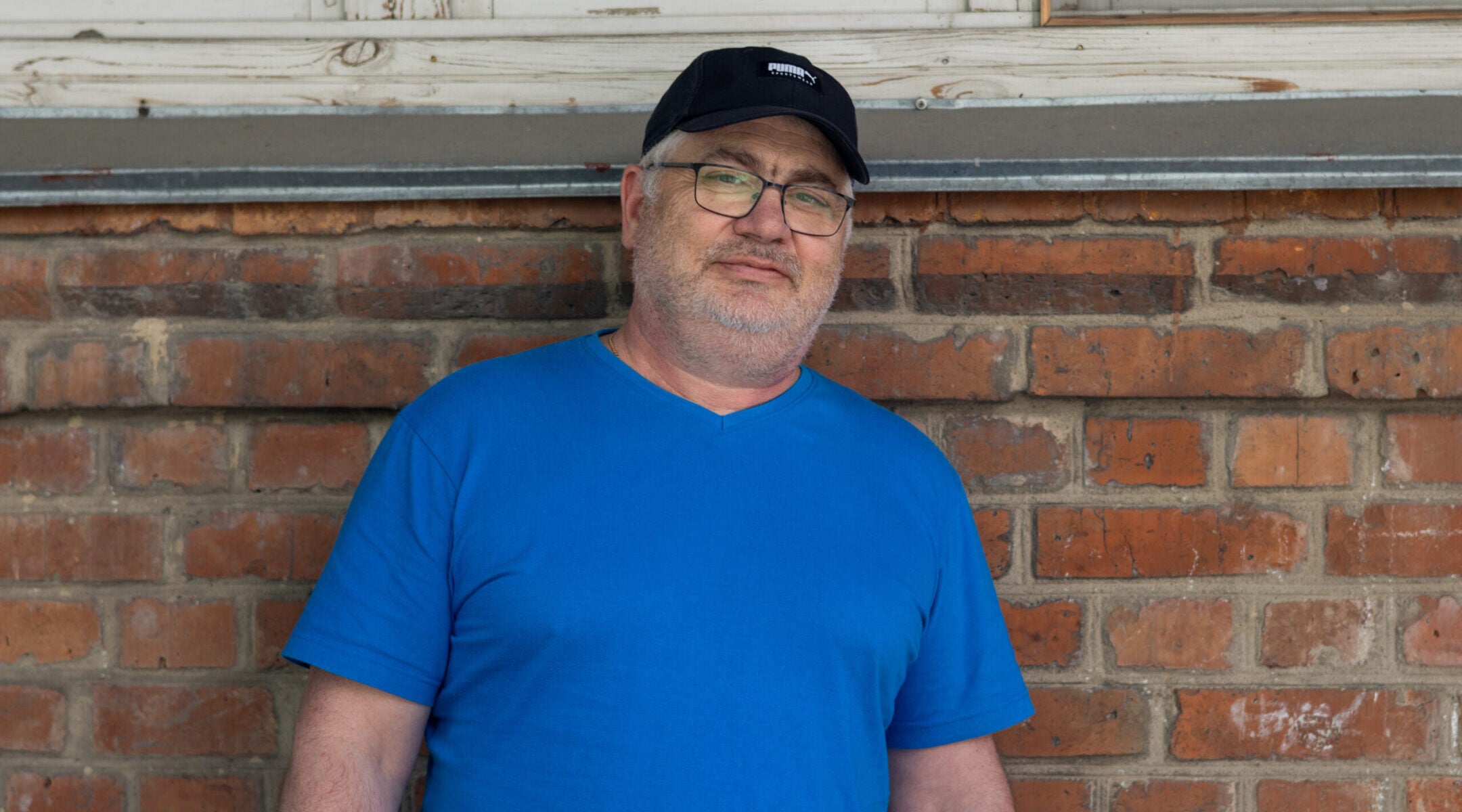
Hennadiy Kysliuk is a leader of the Orthodox Jewish community in Berdychiv, Ukraine. (Theia Chatelle)
For the first weeks of the war, Kysliuk turned the synagogue into a shelter for fleeing families. “I bought a lot of food, and I prepared about 20 places for people to stay. So two families from Kharkiv stayed, and also two families from Kyiv who were driving through Berdychiv from the western part of Ukraine — they stayed here as well,” he said.
For two years, according to Kysliuk, it wasn’t hard to come up with funding for his relief efforts. The Central British Fund for World Jewish Relief and Jewish Federations of North America distributed food, clothing and other resources to the synagogue.
But as the war entered its third year, Kysliuk said, he and the rabbi struggled to find sponsors for their initiatives. They feel like the world’s attention has turned away from the conflict and has left them behind in the process.
They were not alone: After an initial outpouring to Ukraine, where many Jews have a familial connection, Jews around the world were growing weary of the cause. Then, war erupted in Israel in October 2023, redirecting Jewish giving overnight in a way that has challenged Jewish communities across Ukraine.
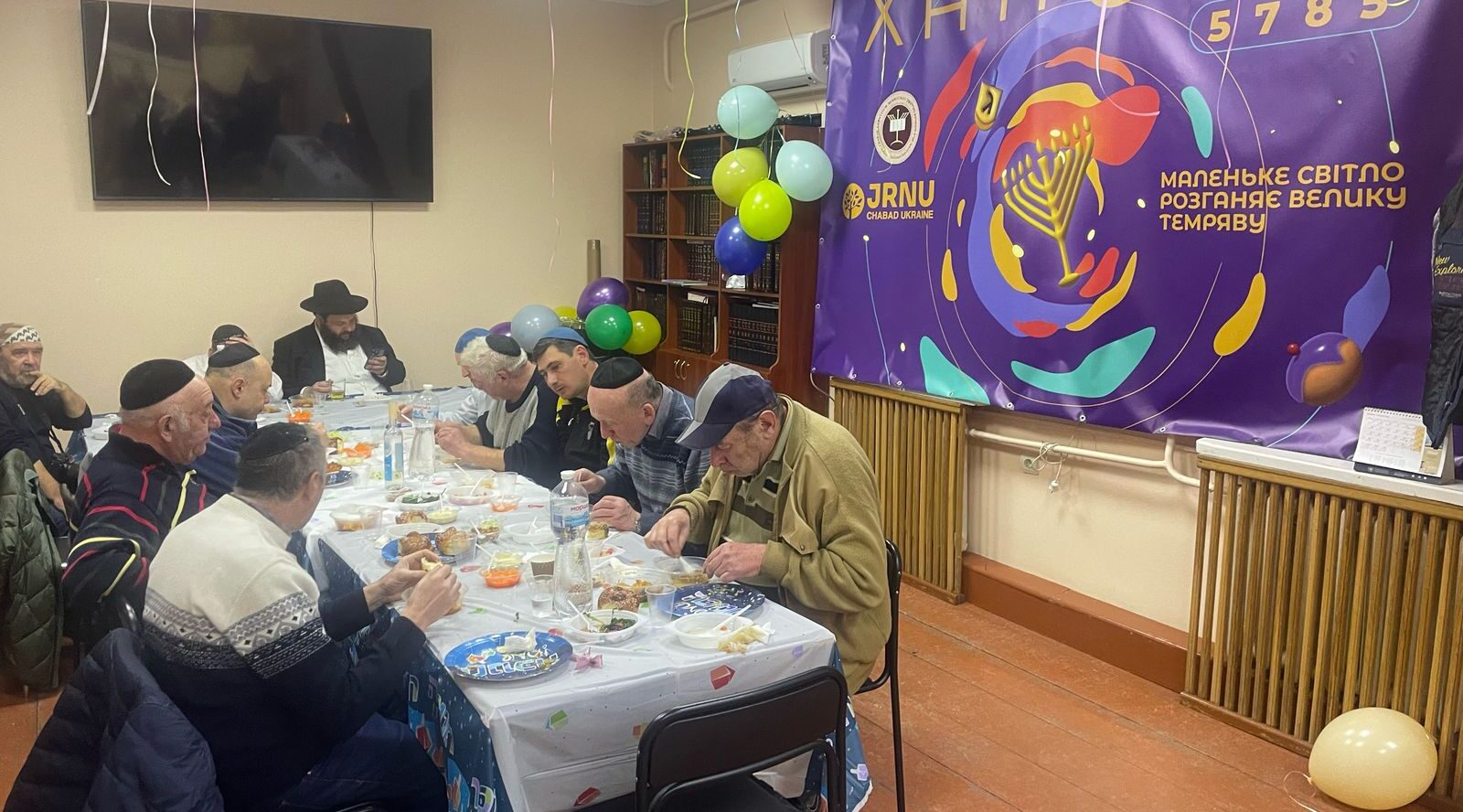
A Hanukkah event at the Chabad of Berdychiv, Ukraine, attracted a mostly older crowd. (Courtesy of Hennadiy Kysliuk)
Kysliuk is still largely occupied with the day-to-day operations of the synagogue: organizing this year’s Passover seder, planning youth events and visiting the elderly in their homes, many of whom have barely ventured outside since the start of the war.
But he is also worried about the future of the Jewish community in Berdychiv. Many families have fled and aren’t planning on coming back. So there are fewer and fewer people left to care for the city’s cemetery or to say Kaddish for those who were killed during the Holocaust. Every year on Sept. 15, he organizes a public recitation at the site of the mass graves on the outskirts of the city.
When asked whether he was worried that Berdychiv’s Jewish youth wouldn’t continue the tradition or would leave the city, he said, “They’ve already left.”
Kysliuk took this reporter on a tour of the city’s monuments to those who were killed in the Holocaust. Many were funded by the German Federal Foreign Office, but others were crowdfunded and installed by the city’s Jewish community. Now, he and other Jewish leaders say they know they will need to make difficult decisions about which relics to prioritize and which may need to be left behind.
According to Kysliuk, the city’s oldest synagogue building has fallen into disrepair and is in desperate need of renovation. But despite significant outreach effort, he has so far been unable to find a sponsor to assist with the costs. And so, Kysliuk said, gesturing at the menorah on the entrance to the synagogue, “It will stay there until it crumbles.”
Some members of the local Jewish community are more optimistic, finding signs of health beyond the city’s Jewish sites.
Vladyslav Shelest, 47 and a non-Orthodox Jewish resident of Berdychiv, has been working since the end of 2023 to support the internally displaced in the city. He is the founder of People Nearby, a group that provides housing, clothing and other forms of assistance to those who have fled fighting in the East. They are doing what they can to live out their Jewish values in the midst of the fighting and aerial bombardment. Upon walking into their office in an unassuming building in the outskirts of Berdychiv, one is instantly greeted with “Shalom.”
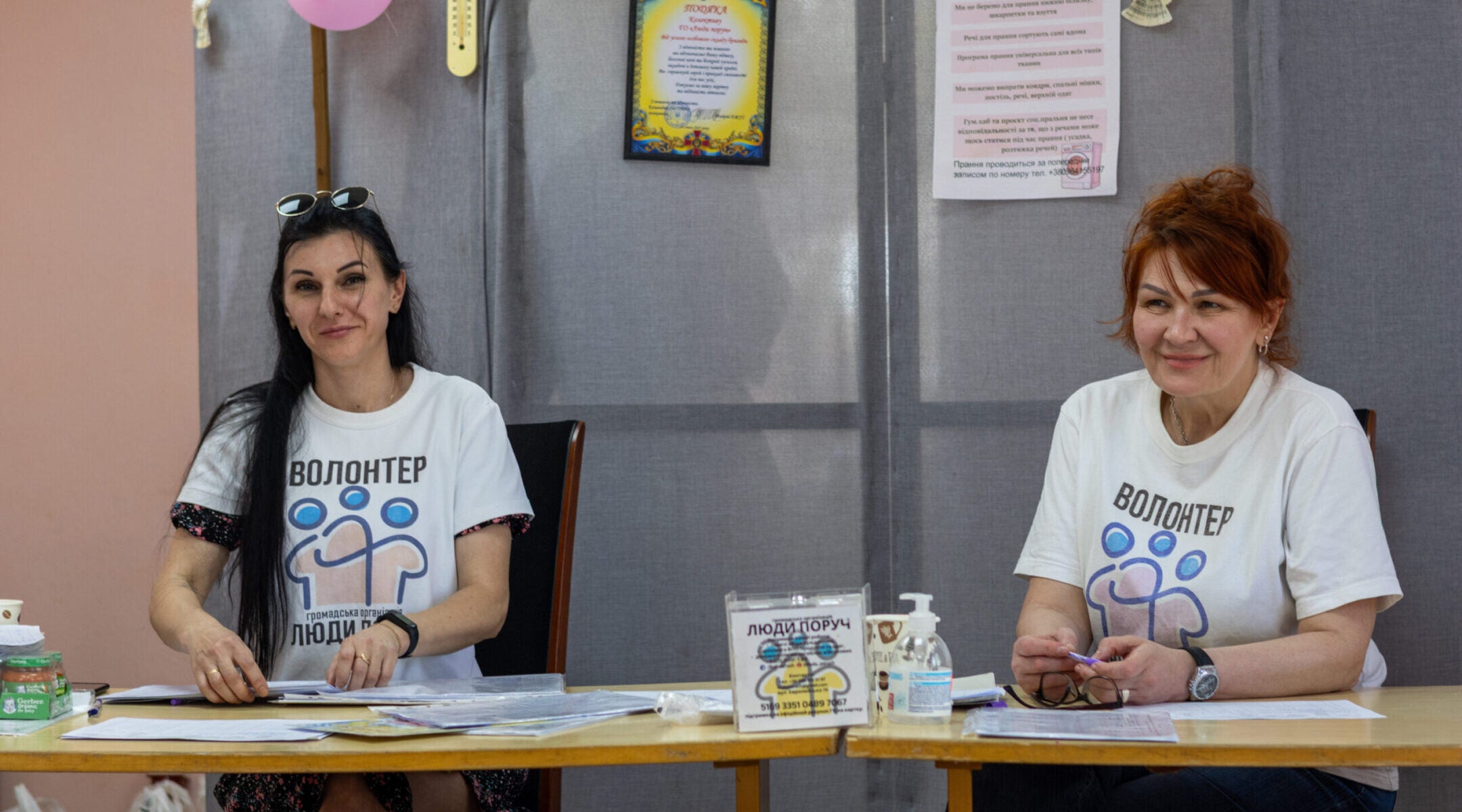
Volunteers with People Nearby, a Jewish nonprofit supporting internally displaced Ukrainians who come to Berdychiv. (Theia Chatelle)
Shelest and his team who all work as volunteers, some internally displaced themselves, have adopted a bootstrap mentality to help those they can.
“ If religious people don’t help those who are in need, the government can’t. It has a different task. It has to defend us,” he said.
One of the displaced is Iryna Shkaptova, 31. Raised in Kyiv’s Jewish community but now living with her husband in Berdychiv, Shkaptova fled to Germany in the first days of fighting, but once she heard her husband had been drafted, she worked up the courage to return.
“ My husband is here and he is serving the army and I can’t leave him,” she said.
After her husband was injured in combat, Shkaptova is incredibly grateful that she was here in Berdychiv to support him with his rehabilitation. Life has returned to a version of normal for her family: “At the very beginning of the invasion, me and my husband thought, okay, maybe it’s not the right time for giving birth, maybe we should do it later. But we don’t know when the war will end, so we thought it was the right time.”
“His name is David,” she said, gesturing at her belly and smiling.
And Kysliuk is doing what he can to respect the memory of the dead. The city’s central Jewish cemetery was destroyed by Soviet authorities in the 1980s and is now a public park. According to Kysliuk, a company expressed interest in developing the plot of land on which the cemetery still lies to city authorities. But Kysliuk objected.
“If you want to build anything, you should respect this land. I asked them not to dig deeper than 30-40 centimeters because it is still a cemetery, even if it was destroyed,” he said, adding that he wrote a letter to Berdychiv’s mayor and is waiting for a reply.
This reporting was supported by the International Women’s Media Foundation’s Women on the Ground: Reporting from Ukraine’s Unseen Frontlines Initiative in partnership with the Howard G. Buffett Foundation.
Evelina Riabenko contributed reporting.
JTA has documented Jewish history in real-time for over a century. Keep our journalism strong by joining us in supporting independent, award-winning reporting.
